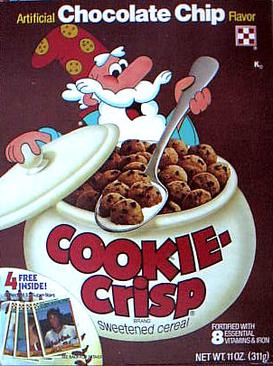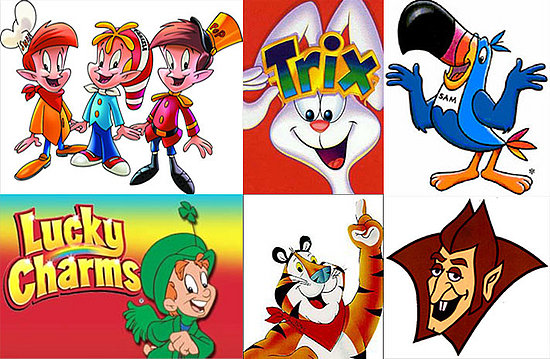
I've always been a sucker for nostalgia. Never has any period in time so inspired me to reveries of childhood bliss as thinking back on 70s Saturday mornings. I spent my formative years engrossed by the idiot box to become a pre-pubescent afficionado of cartoons. From Bugs Bunny to Hong Kong Phooey to the Superfriends to the Flintstones and the Jetsons to Scooby Doo, the Laff-a-lympics and Yogi Bear and Roger Ramjet for good measure, there was never a cartoon that didn't fit into a Saturday morning. And there was never a morning that wasn't supplemented by cereal. From as early an age as I can remember, cereal WAS breakfast. But that's to be expected when I woke up an hour before everyone else in the house to catch the last five minutes of the pre-dawn Agriculture USA before pouring some milk and watching Bugs Bunny and Friends.
And while there were different cereals that represent different times in my life, the constant droning of the cereal company jingles and mascots turned me into a veritable jukebox of commercial hits. The Post family had its big three of course: Alpha Bits, Honey Comb and Sugar Crisp. The wizard, the Honeycomb Kid and Sugar Bear peering out from those primary-colored triumvirate of blue, red and yellow boxes almost daring you not to pour a second bowl. Sure they were sugar-laden, but hell, the Honeycomb Kid had just run Big Zeke out of town "when he kinda missed his horse on the way down and he never did make his get away 'cause the Honeycomb Kid saved the day." That was from memory folks and while I'm not proud about it, I am not unrepentant in my nostalgic haze. I remember years of Fruity and Cocoa Pebbles commercials that teased this young Canadian boy, but alas they were not be found (at that time) north of the border. Post did run into a logic wall in the mind of this 8 year old with Grape Nuts... I still haven't figured that one out.
And while Post relied on its big three, Kellogg's stepped it up a notch. They were the kings of the cereal mascot game. Forget about Marvel and DC comic superheroes, I had Tusk the Elephant, Toucan Sam, Tony the Tiger, Snap, Crackle and Pop, and Dig'em the Frog. Sure, trying to secure one of these cereals was a bit of a harder task as the sugar level shot up... well, not so much for Rice Krispies, but that could be resolved by a generous spoonful of the white stuff that often left the remnant milk at the bottom of the bowl resemble more of a tooth-cringing sludge than anything else - but damn tasty! I remember the Kellogg's line-up most of all from their Snack Pack selections that would often accompany the family on camping trips. The challenge of perforating the mini box along the line and then peeling back the wax paper so that one could pour milk right into the box and eat out of the cardboard coffin was so satisfying. There was always a race between me and my sister to see who could leave other with the 40% Bran at the end of the weekend. Bran's not kid friendly at the best of times much less on a camping trip with a creepy outhouse 100 yards away.
But the sugar content of Kellogg's and their merry mascots were doomed when placed up against the monsters of General Mills. And I do mean monsters quite literally. The monster cereals were the Holy Grail of sugar delivery breakfast foods. Not only were there crispy colored bits made up of mostly sugar, but they were laced with tiny marshmallows that Mills called "marbits" that were made of 100% food-colored, densely-packed sugary goodness. These so-called "marbits" would only even soften up after being saturated in milk for three and a half weeks under a heat lamp - unfortunately, I didn't have time for that so I crunched away. The monster posse was led by one Count Chocula with his Luca Brasi-like strong arm Frankenberry backing him up while the deadly trio of Boo Berry, Fruit Brute and Yummy Mummy mopped up. I had to put together a pretty cogent argument as a 7 year old to convince mom to buy one of the monster cereals. She would try to pitch me on one of the boring Mills cereals like Wheaties or Cheerios. Usually, after a tough negotiation, we ended up at Cocoa Puffs or Trix's silly Rabbit. On a better day I may get Lucky Charms with its own "marbits" of pink hearts, yellow moons, orange stars and green clovers. Yes, I was a bit disappointed when they added Blue Diamond to the mix, but I was willing to forgive. And while I was past the point of caring when Purple Horseshoe was introduced, I'd felt they'd already jumped the shark.
The Quaker family was infrequent at the table due to the tasty, yet deadly, temptations of the Cap'n Crunch line which tempted young children with its sweet and, admittedly, crunchy goodness. Many was the time that a youngster would mercilessly lacerate the top of his mouth when reaching in for a handful of Cap'n, Choco, Cinnamon, Peanut Butter, Punch or Vanilly Crunch cereals. You can't accuse Quaker of not riding a good thing to death. Hell, I didn't mention Crunchberries in that list.
As I was sidling out the era of way-to-early Saturday mornings the Chex brand of cereals took the whole game too far. Sure, we'd been lulled to sleep by the Chex brands for years. What sugar-loving kid ever wanted Corn, Wheat, or Rice Chex. In 1977, things took a turn with the end of innocence for cereal lovers everywhere. Oh, we didn't realize it at the time, but Chex dropped a nuke on children with Cookie Crisp. Every kid wanted Cookie Crisp. Shit, they were mini chocolate chip cookies for christ's sake! But there was the rub. While you could, with best efforts and earnestness, try to convince your mother that any cereal, no matter how sugar-laden, was just cereal and still a viable breakfast option, Cookie Crisp blew that template off the map. There was no way she was going to buy me cookies for breakfast. Hell, decades later I would never buy myself Cookie Crisp for breakfast, but at the time, it was kiddie crack. They even pitched it with freaky Santa Claus-looking wizard named Cookie Jarvis... Cookie Jarvis... what kind of mascot name is Jarvis? It sounds like the creepy guy down the street that everyone thinks molests kids. But he was the pusher.
I don't know if it was because my mother read the ingredients of Cookie Crisp and figured out that same crap that was in there was also in every other cereal I'd ever wanted and, by logical inference, if I wanted Cookie Crisp (which was bad), all other like cereals must be bad. From that year forward came the age of Shreddies, Muffets and Harvest Crunch. Don't get me wrong. I grew to have a great respect for the cereal of my burgeoning youth. I started to actually look forward to the 237 seconds it took for every Shreddie in a bowl to turn to mush. I found solace in the artificial sweetener that I carefully dispensed from the paper packet in circular precision over my bird's nest Muffet. I even learned, after several weeks, that a correct portion of Harvest Crunch is not the normal bowlful of other cereals - and that my jaw would hurt for the rest of the day if I over-indulged. I did not know, at the time, that my childhood was running away from me like so much mottled milky sugar remnants, upturned in the kitchen sink of life, waiting for the hot water to baptize the bowl anew.
And from that point on, cereal was dead to me.
Fuck you Jarvis.







